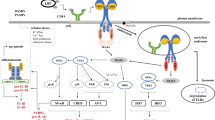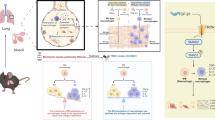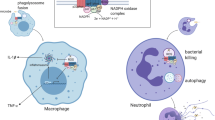Abstract
Neutrophils play a central role in host defense and are recruited in vast numbers to sites of infection where they phagocytose and kill invading bacterial pathogens. Neutrophils have a short half-life that is extended at the inflamed site by pro-inflammatory cytokines and contact with bacterial cell walls. Normal resolution of inflammation involves the removal of neutrophils and other inflammatory cells by the induction of apoptosis. Spontaneous neutrophil apoptosis does not require Fas ligation, but is mediated by caspases 3, 8 and possibly caspase 9 and also involves activation of protein kinase C-δ. With chronic inflammatory disease, neutrophil apoptosis is delayed by pro-inflammatory cytokines, leading to persistence of neutrophils at the inflamed site and non-specific tissue damage. Here we discuss the evidence for inhibition of neutrophil apoptosis via signaling though PI-3-kinase and downstream pathways, including PDK-1 and PKB. Therapeutic strategies to resolve chronic inflammation could therefore usefully target neutrophil apoptosis and the PI-3-kinase or PKC-δ signaling pathways.
Similar content being viewed by others
Author information
Authors and Affiliations
Rights and permissions
About this article
Cite this article
Webb, P.R., Wang, KQ., Scheel-Toellner, D. et al. Regulation of neutrophil apoptosis: A role for protein kinase C and phosphatidylinositol-3-kinase. Apoptosis 5, 451–458 (2000). https://doi.org/10.1023/A:1009601220552
Issue Date:
DOI: https://doi.org/10.1023/A:1009601220552




